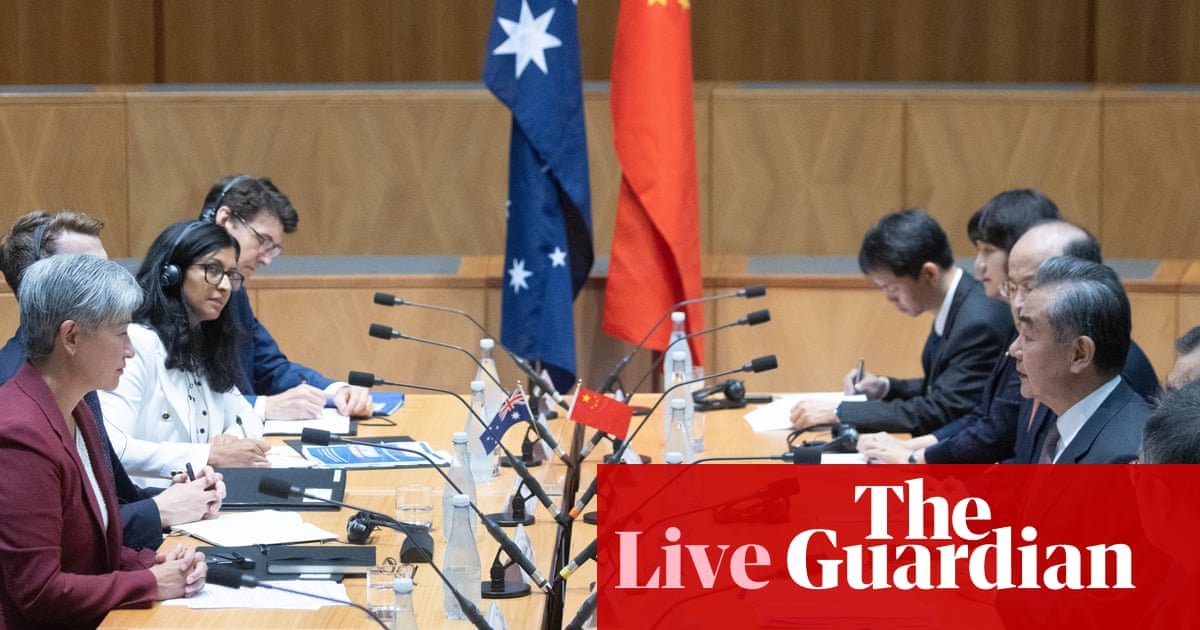Wong tells China’s foreign minister of ‘shock’ over Yang Hengjun sentence
What are those issues?
Penny Wong:
We discussed the sentencing of Dr Yang Hengjun. I told the foreign minister Australians were shocked at the sentence imposed and I made clear to him the Australian government will continue to advocate on Dr Yang’s behalf.
I also raised our concerns about other Australian death penalty cases, as you know, Australia opposes the death penalty in all circumstances for all peoples.
I welcome the progress towards removing trade impediments and reiterated our desire for the beef and lobster. We discussed repeat volatility on nickel markets and I made the point that predictability in business and trade is in all our economic interests.
I raised Australia’s concerns about human rights, including in Xinjiang, Tibet, and Hong Kong. I expressed our concern, our serious concern about unsafe conduct at sea, our desire for peace and stability across the Taiwan Strait, and in our region. I reflected the review of our region as outlined again and underscored again at the recent Asean summit about the importance of the South China Sea being governed by international law, particular UNCLOS.
We do have important differences. Dialogue enables us to manage our differences. It doesn’t eliminate them, but this government in the interests of Australia, will always seek to manage those differences wisely.
Key events
Bridget Archer and David Pocock have been officially awarded their McKinnon prizes for political leadership:
Back to Queensland, and while premier Steven Miles wouldn’t deny a media report the cabinet considered cancelling the Olympics, the infrastructure minister has:
Minister for infrastructure Grace Grace flatly denied the government received any advice of any type as to whether they could cancel the Olympics, “formal” or “non-formal” in response to a question by LNP MP Andrew Powell.
The veteran cabinet minister nearly shouted her answer.
The answer to the question is no!”
The press conference ends.
You’ll hear from our foreign affairs correspondent Daniel Hurst and political editor Karen Middleton on that meeting, very soon.
And then we are on to the third (and I believe last) question from the travelling media pack:
Thank you for having media. My first question is what other major concessions that Australia and China reached today after them meeting with Wang Yi and what other specific measures to both sides agree to, in the stress between the relationship between Australia and China. When you were at AFI Summit last week, you mentioned the word stabilisation. Besides this keyword, I’m wondering if you have any other keywords in mind after the meeting today?
Penny Wong:
I have gone through some of the points that were discussed in the meeting and I would make the point that we were pleased that we are on track for a premier visit and one of the important things that we did agree was to ensure that both sides work together to prepare for a visit, which, the Prime Minister is looking very much forward to welcoming the premiere here.
Those high-level visits and engagements are very important part the relationship. The face-to-face discussion is not just having a discussion, it is understanding where both sides are coming from. It is important to have that ballast and stability in the relationship.
As I said, we obviously want a productive relationship with China and a mature relationship with China and I think that is shared.
I am very pleased that the Foreign Minister made time to come to Australia. I know he has a punishing schedule and I look forward to the next foreign and strategic dialogue in China.
I did express to him that this time we might not try in the middle of the [winter] because it was quite chilly, and I’m sure some of the travelling media will be happy with that.
Back to the Australian media questions (I believe this is the third and last)
Q: Minister Wong, Donald Trump this morning was asked about past criticisms that Kevin Rudd, Australia’s ambassador to Washington, had made of him. And Trump replied, “I heard he was a little bit nasty. I hear he’s not the brightest bulb. If he’s at all hostile, he won’t be there long.” Does it show it was a mistake or very risky for the government to appoint Kevin Rudd as ambassador, given his comments were well known and Donald Trump had already declared his candidacy at the time, and secondly, will the government keep Kevin Rudd as ambassador if Donald Trump returns to the White House?
Penny Wong:
The answer is yes. In relation to the former, what I would say is this, even Mr Dutton has expressed confidence in Mr Rudd. Mr Rudd is a very effective ambassador. He’s recognised as doing across this Parliament, as doing an excellent job in advancing Australia’s interests in the United States. I point you in particular to the phenomenal amount of work being done on Aukus in the period that he been ambassador. He has been active in engaging with members of Congress on both sides of politics and he is a former prime minister, former foreign minister, is experience and skills mean he will be able to work closely with whoever is elected by the American people as the United States President.
The second journalist from China asks their question:
Q: This morning foreign minister Wang Yi mentioned China will announce a decision on the Australia wine tariff in May. So may I ask, how impactful do you expect it to be? On the wine industry as well as the economy of Australia? Other concern will be lifting the trade restriction on lobsters. Was the progress about it so far?
Penny Wong:
Well, we think it’s very, we’re very proud of our wine and our lobster and our beef. We think Chinese consumers would benefit from those, all those products having access to the Chinese market without any impediments. That’s been the position we’ve put for some time. As I said to your colleague earlier, on wine, we welcome the interim decision. We look forward to a final decision. As a South Australian, I’m particularly interested in ensuring that we get access for our fantastic Australian wine. And also lobster, which I know is something that is enjoyed by all. We’ll continue to advocate for all impediments to be removed. We think it’s in both countries’ interests. Did I miss any part of your question?
[Lobsters]
Wong:
I think that’s a question to the Chinese authorities. We have continued to press for all impediments, including in relation to lobster, to be removed. We look forward to that occurring.
The second Australian journalist asks a question:
Q: What are you advocating for, for Yang Hengjun? Is it for the death sentence to be lifted or him to return home? I have to ask, as a South Australian, will Adelaide zoo continue to have pandas for years to come?
Penny Wong:
Firstly in relation to Dr Yang, I – we’ll continue to advocate on his behalf. And I reiterated the – that Australians found the sentence imposed shocking. I don’t propose to outline every aspect of what we put on Dr Yang’s behalf in the media.
But I would say to you, I did want – as I told the media I would, when the sentence was handed down, we’ll not walk away from our advocacy for Dr Yang Hengjun.
On the pandas, there’s obviously further arrangements to be finalised. But I think, I think the – the news of the likely continuation of panda presence in Adelaide Zoo has been reported. And I do – I did say to the foreign minister my children would be very pleased.
Q: So done deal on pandas?
Wong:
There’s further arrangements to be put in place. I think we’re – we’re on a good path there to continued panda presence.
‘Australia will continue to be Australia, China will continue to be China’
Next question goes to a member of the travelling media from China:
Many Chinese people believe the bottleneck in Australia-China relations lies in Australia’s lack of trust in China. What kind of threat do you think China will pose to Australia? And Australia and China have large trade relations but there’s many restrictions on science, technology, and education. I would like to ask in such an atmosphere, do Australia-China relations only seek uncertainty rather than development? Thank you.
Penny Wong:
Well, the first point I would make is I think stability is a good thing. We seek a stable and productive and mature relationship with China. This is, you know, consistent with what we have said, the prime minister Albanese and premier Li have reiterated the importance of a stable and constructive bilateral relationship.
Nothing is important for us to recognise how much progress we have made in a short period of time. We have resumed the foreign and strategic dialogue and the annual leaders’ meeting. This is really important. As I said, Australia will continue to be Australia, China will continue to be China. We are bound by geography, by history, by our peoples, by our trade.
We know there are differences that arise out of who we are. We want to manage them wisely. We have resumed trade talks and economic talks.
We have consultations on consular issues, defence and climate. We have commenced technical cooperation on climate-related matters and our police work together to counter narcotics trafficking and transnational crime. We welcome the education minister here to Canberra and now the foreign minister. There’s been a lot of progress in the relationship in a short space of time and that’s a good thing. And we’ll continue to engage.
We think it’s in our national interest to engage, just as there will be issues where we cooperate and issues where we can disagree.
Wong: ‘It’s in the interests of both nations for all trade impediments to be removed’
First question is an Australian journalist:
Q: We learned today that the government is now dropped its anti-dumping action against Chinese wind turbines. The Global Times says this shows Australia’s distancing itself from the anti-China position of the US. Is thinks a quid pro quo, and – could you update us on the latest on wine, beef and lobster and will the government adopt a softer position on China’s bid to enter the CPTPP?
Penny Wong:
There’s been no change to the position I have outlined previously. The relation to the assertion – the earlier point you made, there’s no relationship between the wine dispute and the steel disputes. Obviously the wine issue has been dealt with through the WTO processes and associated negotiations. Minister Husic has made an evidence – has made a decision based on the apolitical and evidence-based recommendation from the anti-dumping commissioner. And Australia has made clear the independence of that commission and our trade remedy system.
And on wine?
There’s an interim decision on wine. We look forward to the timetable that has been outlined … by the Chinese side for the final decision on wine. And we continue to express our view as I have since I became foreign minister that we believe it’s in the interests of both nations for all trade impediments to be removed.
Wong tells China’s foreign minister of ‘shock’ over Yang Hengjun sentence
What are those issues?
Penny Wong:
We discussed the sentencing of Dr Yang Hengjun. I told the foreign minister Australians were shocked at the sentence imposed and I made clear to him the Australian government will continue to advocate on Dr Yang’s behalf.
I also raised our concerns about other Australian death penalty cases, as you know, Australia opposes the death penalty in all circumstances for all peoples.
I welcome the progress towards removing trade impediments and reiterated our desire for the beef and lobster. We discussed repeat volatility on nickel markets and I made the point that predictability in business and trade is in all our economic interests.
I raised Australia’s concerns about human rights, including in Xinjiang, Tibet, and Hong Kong. I expressed our concern, our serious concern about unsafe conduct at sea, our desire for peace and stability across the Taiwan Strait, and in our region. I reflected the review of our region as outlined again and underscored again at the recent Asean summit about the importance of the South China Sea being governed by international law, particular UNCLOS.
We do have important differences. Dialogue enables us to manage our differences. It doesn’t eliminate them, but this government in the interests of Australia, will always seek to manage those differences wisely.
Wong holds press conference after meeting with China’s foreign minister
The meeting between Penny Wong and Wang Yi has concluded.
Wong is holding a press conference without Yi. Despite many requests from the media, Wang did not agree to a press conference.
A ballot decided which journalists would be able to ask questions (which is standard for these bilateral meeting press conferences – travelling media also get some questions and usually go through the same process).
Wong opens with:
A stable relationship between Australia and China doesn’t just happen. It needs ongoing work. And this was the latest meeting in that process.
As minister Wang reflected in that meeting, it’s in both our interests we have a mature and productive relationship. We discussed a range of shared interests in the progress we have made our outcomes agreed at the sixth foreign and strategic dialogue, including the re-commencement of the bilateral annual leaders’ meeting.
The prime minister looks forward to welcoming Premier Li to Australia. I’m pleased this is on track and we agreed on work to prepare for that meeting. We agreed to continue bilateral meetings on consular issues, defence and trade, and expand our dialogue on key areas of importance, such as the Pacific, climate and energy cooperation, and enhance understanding and transparency.
The meeting was an opportunity for both the minister and I to exchange frank views on issues that matter to us.

Andrew Messenger
Queensland government denies it considered cancelling Olympic Games
In the Queensland parliament, the LNP MP Tim Mander used question time to ask the Queensland government to confirm media reports that they had considered cancelling the 2032 Olympic Games.
Premier Steven Miles flatly denied a report from Channel Nine that said the government had considered but rejected the idea at Monday’s cabinet meeting, but he didn’t quite repeat it in parliament today. Miles said:
It is a key tenet of functioning government that those discussions are confidential and so I won’t be confirming or denying any particular discussion.
What I can tell you very very clearly is that the Queensland Government resolved at our meeting Monday to put on the best Olympic and Paralympic Games ever, but to do it without building the new $3.4bn stadium.
It’s an interesting position for the government to take, given that they’re planning to make cabinet documents public within a month.
RBA review creating legislative headaches
The RBA review legislation continues to create headaches for treasurer Jim Chalmers.
Chalmers ordered a review into the RBA and how it operates. The three-person review panel handed that review to Chalmers who accepted all its recommendations. Some have already been adopted by the RBA – that’s why you see press conferences after board meetings now. Some require legislative change, and those are the ones causing a bit of drama.
One of those issues is the recommendation to remove the section 11 powers that allow the treasurer of the day to intervene with the RBA. It is a break-in-case-of-emergency type power which is there in case the RBA, which ultimately works for the Australian people, starts working against the welfare of the Australian people.
(For those who missed the previous explainers on this, the power dates back to an issue during the Great Depression when the central bank at the time, then the Commonwealth Bank, refused to release funds for a nation building infrastructure program. The nation was plunged into recession that took 10 years to recover from and unemployment hit 32%. So when it came to setting up the RBA in the 1950s, the Menzies government accepted recommendations to create some sort of emergency power. It has never been used, and comes with all sorts of safeguards – the treasurer has to explain themselves publicly for using it for example, and most people involved in RBA land, including former treasurers and governors, think it needs to stay as a safeguard.)
Another of those issues is the creation of a second board. The recommendation is to split the RBA board into two boards – one that deals with monetary policy (interest rates) and the other that deals with governance (economics academics getting their time in the sun). The RBA governor would sit on both. The review panel said current board members should be given a choice on which board they sit on.
Not everyone thinks that is a good idea either (because what is the point) but Angus Taylor has written to Chalmers saying he wants to see all current board members moved across to the new monetary policy board.
It’s all a bit inside baseball (or inside RBA) but it goes to some of the issues behind this legislation – the government can’t pass it without the Greens or the Coalition and the Greens aren’t a fan of the removal of section 11 or the two boards, and if the Coalition won’t come to the party then Chalmers has to deal with the Greens. And he has said he doesn’t particularly want to do that, on this piece of legislation.
So now it is back and forth with Taylor. A spokesperson for Chalmers said:
The Government has been clear it wants to see continuity on the new RBA boards – that means continuity on both the monetary policy board and the governance board.
Angus Taylor’s position puts him at odds with the comments this week by the RBA Governor and the recommendations of the independent RBA Review.
We will continue consulting with the Opposition and are committed to working in a bipartisan way to pass this bill because the future of Australia’s central bank should be above politics.
Rules on MPs’ ad spending relaxed to lessen public servants’ workload
For those wondering how transparency is going under this government, Josh Butler has looked at some of the reporting around MPs printing budgets:
The finance department admits there is now less transparency around what federal MPs spend on junk mail and online advertising as a result of a push to reduce admin scutwork for public servants.
The change to expense reporting means voters will now have no insight into what federal MPs buy with their printing and communications budget, including self-promotional pamphlets and online advertising.
Newly released expense reports show some politicians are spending over $100,000 on printing and communications per quarter.
The quarterly expense reports were previously presented with itemised spending on newspaper subscriptions, books and printing. They are now generalised to only give a dollar figure, under the broad category “Publications – Printed and electronic” and “Printing and Communications”.
Over in the house, debate has resumed on the government’s changes to the administrative appeals tribunal (AAT), which will become (once passed) the administrative review tribunal.
Independent MPs have some concerns over the appointment process for the new body, but the government does not share them, so their amendments will not get through the house.








